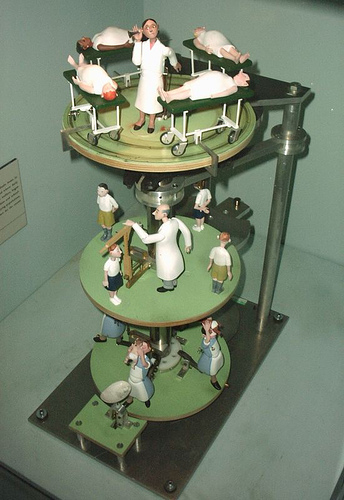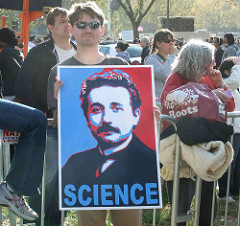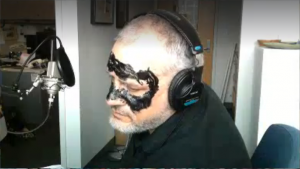Podcast: Play in new window | Download (Duration: 51:53 — 71.3MB)
Subscribe: Spotify | RSS | More
![[New York, New Haven and Hartford Locomotive No. 321 crash through roundhouse] by SMU Central University Libraries train crash photo](http://theshortcoat.com/wp-content/uploads/2017/05/8880203918_16cc7d8065_m_train-crash.jpg)
Podcast: Play in new window | Download (Duration: 51:53 — 71.3MB)
Subscribe: Spotify | RSS | More
![[New York, New Haven and Hartford Locomotive No. 321 crash through roundhouse] by SMU Central University Libraries train crash photo](http://theshortcoat.com/wp-content/uploads/2017/05/8880203918_16cc7d8065_m_train-crash.jpg)
Podcast: Play in new window | Download (Duration: 46:35 — 64.1MB)
Subscribe: Spotify | RSS | More

Improvisational acting is a greater part of medical school than one might expect. Between pretending to be doctors for one’s simulated patients, or acting like you know what you’re doing when you’re not entirely sure, a big part of med ed is faking it until you make it. So Dave, in his never ending quest to offer (ahem) valuable teaching moments, asks Mark Moubarek, Irisa Mahaparn, Kaci McCleary, and newcomer Johnny Henstrom to put on their masks once again for a game of General Haze-pital. Will Johnny be cured by the dashing doctor Dr. Mark and his two eager med students, Kaci and Irisa? Tune in to find out. Dave is always happy to hang students’ art projects up in the building (over the objections of the architect), and Irisa’s latest work has taken its rightful place on the walls of MERF. Also, we discuss the recent trend of trying to cure public health issues by using market forces, including the recent proposal to tax prescription opioid manufacturers a penny per milligram to fund addiction treatment and prevention. And an Indian medical student turns to Whatsapp to deliver a baby on a train…thus fulfilling a heroic daydream we’ve all had about saving the day in dire circumstances. Listeners, share your thoughts with us each week. Call us at 347-SHORTCT anytime, or send your greetings to us at theshortcoats@gmail.com. Continue reading General Haze-pital
Podcast: Play in new window | Download (Duration: 52:52 — 72.6MB)
Subscribe: Spotify | RSS | More


We’ve got a crowd of M1s in the house rapidly approaching the end of their first year. This past week, Kylie Jade Miller, Levi Endelman, Adam Erwood, and new co-host Irene Morcuende took their physical exam skills practical exam; and they discussed some research they did at the intersections of medical and society–the public health implications of the American-as-apple-pie cycle of incarceration, the effects of Medicare expansion have had on access to mental healthcare, what happens when substance abuse sufferers are offered clean needle and Narcan, and whether taxing sugary drinks have an effect on obesity. Dave, seeing an opportunity to torture his co-hosts, put them through a Pop Quiz: can they discern if the research he presents to them is real or from the depths of Dave’s mind? Kylie uses the occasion to let her secret gunner out. Listeners, we offer free advice! Call us at 347-SHORTCT anytime, or email us at theshortoats@gmail.com.
Podcast: Play in new window | Download (Duration: 1:06:20 — 91.1MB)
Subscribe: Spotify | RSS | More


Dave is no scientist, but he is ‘science-adjacent.’ This week, after having read of research involving the benefits to brain function conferred by Marmite consumption, he conducts his own experiment on SCP hosts John Pienta, Kaci McCleary, Aline Sandouk, and Nathan Miller. Will they be able to use their new Marmite-based powers to pass Dave’s Pop Quiz and identify actual Amazing Health Products You Can Get? Listener Hannah wants to know all about the medical science training program lifestyle, and how it differs from the MD student experience, and since Aline is an MSTP student herself, Hannah’s in luck. And 23andMe has finally received approval from the FDA to offer genetic screenings for defects that either one already knows about or that knowing about might do more harm than good. Listeners, if you like what you hear today, please leave us a review on iTunes!
Continue reading Consumer Genetic Testing, Marmite for Your Brain, and Counting Human Calories
Podcast: Play in new window | Download (Duration: 41:35 — 57.1MB)
Subscribe: Spotify | RSS | More


Among the topics we Short Coats often ruminate on is the lack of basic science literacy in the public and press…and among politicians. How did we get to this place when science is so mistrusted? So Kelsy Adler, Levi Endelman, Lisa Wehr, Marc Toral, and Laura Quast were excited to talk with someone who is doing something about it. Shaughnessy Naughton is the founder of 314 Action, an organization that seeks to address dearth of science knowledge among politicians directly by encouraging and financing the election of people with STEM backgrounds to public office at all levels. Shaughnessy Naughton is a chemist by trade and the founder of 314 Action, which “champions electing more leaders to the U.S. Senate, House, State Executive and Legislative offices who come from STEM backgrounds.” The organization seeks to change politicians’ active resistance to the acquisition of data on things like gun violence and climate change, and push back on ignorance of the evidence that already exists on topics like vaccinations and evolution. Among the challenges they face is the perception that science is above politics; the task of creating and financing a network of donors and supporters; and understanding and effectively countering the career politician’s bias toward certainty instead of nuance. They’re also addressing the need for training people of science to move beyond simple advocacy so that they can engage with the political process and change the system’s anti-science biases from within. Listeners, share your thoughts with us each week. Call us at 347-SHORTCT any time, and see our Facebook page for occasional Live shows in which you can participate.
Continue reading 314 Action: Encouraging People of Science to Make the Leap into Politics
Podcast: Play in new window | Download (Duration: 48:40 — 66.8MB)
Subscribe: Spotify | RSS | More

Sometimes, Dave has ideas. This time Dave’s idea was to get his long-suffering co-hosts to enjoy the YouTube beauty treatment known as The Black Mask. Because, dermatology! Which is better, the DIY treatment or the store-bought version? Kaci McCleary, John Pienta, Adam Erwood, and Lisa Wehr will try to suss it out so you don’ t have to. Also, we discuss Iowa’s shortcomings with respect to mental health–its recent closures of state mental health hospitals and the reduction of psych beds across the state–as well as Iowa’s recent moves counter to the trend–adding hospital beds and even residency programs! Meanwhile, is the anesthetic ketamine poised to revolutionize emergency treatment for suicidal depression? It’s been many years since we had a new class of drugs to treat depression, but as always there are risks and doubts to be considered. On a related note, Dave attended a meeting of CCOM’s new chapter of the National Alliance on Mental Illness, and John reviews briefly the College’s new class “The Thriving Physician,” both meant as antidotes for medical education’s deleterious effects on mental health. Listeners, share your thoughts with us each week. Call us at 347-SHORTCT any time, and see our Facebook page where we often broadcast our recording sessions live so you can join in on Fridays.
Podcast: Play in new window | Download (Duration: 55:03 — 75.6MB)
Subscribe: Spotify | RSS | More


This episode is all about false dichotomies–situations or ideas that seem like dilemmas (and thus require a difficult choice to be made) but which really aren’t. Much of the public discussions of things like the hours that residents work, the funding for medical research, the lifestyles that residents are forced to lead, the choices that prospective medical students make are couched in terms of either/or choices. Corbin Weaver, Matt Wilson, John Pienta, and Kaci McCleary discuss the alleged dilemmas that we encounter in medicine and medical education, and conclude that these choices are often not mutually exclusive. It is possible to have both shorter hours and safer patient handoffs and quality education, despite rules that seem to indicate otherwise. It is possible to adequately fund basic science research and fund a sensible national defense, despite presidential budgets that slash NIH funding. Should listener Justin study during the summer prior to med school to begin medical school on the right foot, or will he struggle if he takes a break to live a little? And listener Julian is super annoyed at the admissions process. Is his ire justified? Listeners, share your thoughts and questions with us each week. Call us at 347-SHORTCT any time.
Podcast: Play in new window | Download (Duration: 51:34 — 70.8MB)
Subscribe: Spotify | RSS | More


Statistics on human trafficking vary, but Dr. Shannon Findlay, an Emergency Medicine resident at the University of Iowa Hospitals and Clinics, offers some sobering information. It is believed that 21 million people worldwide are affected by human trafficking, and perhaps 18,000 people are trafficked into the United States every year in forced labor or sex work. It’s not just people being brought into the country against their will, either, or even moved across state lines. Even people within their home towns can be victims. Recognizing that someone is a victim of human trafficking is difficult, as there are so many variables and misunderstandings to overcome. Physicians may be running across victims and not realizing it, even if something doesn’t seem right about a patient interaction. Corbin Weaver, Tarek Karam, and Kylie Miller join Dr. Shannon to discuss the problem, how physicians can recognize potential victims, and what they can do about it. And with Match Day around the corner, Dr. Findlay also recalls her match experience as well as offers advice to new residents in their intern year. Listeners, share your thoughts with us each week. Call us at 347-SHORTCT any time, and see our Facebook page where we record Live to include your questions and comments in the show.
Continue reading Human Trafficking and What Physicians Need to Know, with Dr. Shannon Findlay
Podcast: Play in new window | Download (Duration: 47:07 — 64.7MB)
Subscribe: Spotify | RSS | More


Dr. Sharon Larson is Iowa’s first female cardiothoracic surgeon. You might be forgiven for thinking that Iowa’s been a bit backwards for not having had this glass ceiling broken sooner, but there aren’t exactly a surplus of women who’ve sought out this demanding career. In the United States, only 5% of CT surgeons are women in this already-tiny specialty. When Dave read about her in the local paper, he figured she’d be a great guest for Kylie Miller, Philip Huang, Hadeal Ayoub, and Erin Pazaski to talk with about things like glass ceilings and how women succeed in a man’s world. Turns out, Dave was right–she’s a great guest to talk to about the long road to becoming an attending in her field, what male surgeons should know about female surgeons and vice versa, and how a woman might find she and her friends taking golf lessons to prove a point. Listeners, when you talk to us, we do our best work. Call us at 347-SHORTCT any time, and email theshortcoats@gmail.com.
Continue reading Cardiothoracic Surgery: A Woman’s World, For Dr. Sharon Larson
Podcast: Play in new window | Download (Duration: 47:54 — 65.8MB)
Subscribe: Spotify | RSS | More


This week we start with some feedback from listener Paulius, who has a suggestion for a future show on the unsung heroes of primary care. Thank you! Dave bats the idea around with John Pienta, Kylie Miller, Tarek Karam and Elizabeth Shirazi. Meanwhile, as biomedical science grapples with a study-replication crisis perhaps caused by structural problems that discourage repetition in favor of novel findings and breakthroughs, we consider the advice of Ioannis Yannas, one of the inventors of artificial skin. Are cat lovers really at risk for schizophrenia? A large UK study says piffle, although cat-lover Kylie points out that there are some caveats. And though Tarek and Kylie are well-behaved on the mic, their individual approaches to weather-related flight delays reveal some points of contention. Listeners, share your thoughts with us each week. Call us at 347-SHORTCT any time, and ask us questions on Fridays at noon as we record the show while broadcasting on Facebook Live!
Continue reading Happy Glitches, Research Niches, and Doc Dash Pitches